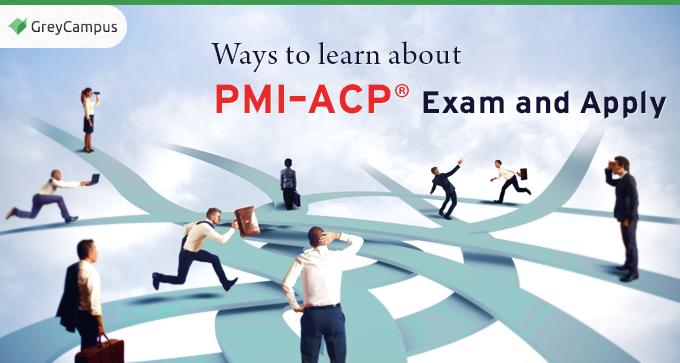Ways to learn about PMI-ACP Exam and Apply
In a bid to help
businesses respond to unpredictability, the agile movement developed and grew through the 1990’s as an alternative to traditional project management methodologies that were largely driven by a rigid sequence of stages, processes and plans. While the waterfall model worked well for small projects with a limited scope of work and few variables, it could not cope with the dynamic and evolving demands of the emerging IT industry.
The agile approach adheres to the principles of lean development, which translates to an increased emphasis on efficiency so as to facilitate value addition in the product or service that is delivered to the end customer. Typically limited to software development,
agile principles and practices are being applied by Project Managers in a variety of industries and organizations through all sorts of knowledge worker projects.
The Agile Manifesto highlights the importance of:
- Individuals and interactions over processes and tools
- Working software over comprehensive documentation
- Customer collaboration over contract negotiation
- Responding to change over following a plan
Recognizing the need for a greater speed and flexibility in product development, Scrum was developed as an
Agile framework for completing complex projects during the late 1990’s. Scrum recognizes that the customer can change the project requirements anytime during product development and therefore focuses on maximizing the team's ability to deliver quickly and respond to emerging requirements.
Who should invest in the PMI-ACP Certification?
The
PMI-ACP certification is recommended for practitioners working in organizations that use agile practices and methods. Earning the PMI
Agile Certified Practitioner certification will help portray your knowledge of and commitment to this rapidly growing approach to project management. It will help practitioners to demonstrate to employers their level of professionalism in agile principles, practices, tools and techniques, at the same time helping them increase their professional versatility.
The
PMI-ACP certification is designed to verify project managers’ mastery of Agile principles and processes, validating their existing expertise to companies looking to adopt the
Agile methodology.
Ways to learn about the PMI-ACP Exam:
The best place to learn about what the PMI
Agile Certified Practitioner (ACP) is all about is the Project Management Institute’s (PMI) website. The PMI site must be the primary source of information on all PMI certifications including ACP.
On the PMI website section for ACP, you can check if your project management experience satisfies the PMI-ACP
eligibility requirements. You can also get detailed information from the PMI ACP Handbook which can be downloaded and reviewed from the PMI website. The website also offers an option to Register for free on the PMI website, which also becomes necessary if you eventually decide to apply for the ACP exam.
All the relevant details concerning the PMI ACP certification, experience, and project management study prerequisites that must be met to qualify for the ACP are available on Pages 7-8 of the PMI ACP Handbook.
Eligibility Requirements for PMI-ACP:
-
A General Project Experience of 2,000 hours working on project teams. These hours must be earned within the last 5 years. It should be noted that Active PMP® or PgMP® will satisfy this requirement. A minimum of 12 months of project management experience wherein gaps in experience and overlapping experience must not be counted.
-
Agile Project Experience of 1500 hours working on agile project teams or with agile methodologies. These hours must be earned within the last 3 years. It should be noted that these hours are in addition to the 2,000 hours required in “general project experience”. Minimum of 8 months of Agile project experience wherein gaps in experience and overlapping experience must not be counted.
-
Training in Agile Practices for 21 contact hours. These hours must be earned in Agile project philosophy, methodologies, principles and practices. It should be noted that self-directed learning (e.g., reading books, watching instructional videos or sessions with coaches or mentors) does not qualify.
To apply for the PMI-ACP, register and log in to get started. A printable PMI-ACP printable application form is also available on the following URL:
http://www.pmi.org/Certification/~/media/PDF/Certifications/PMI-ACP-Print-Application-Forms.ashx
You have 90 days to complete the application once you have begun.
More about the PMI-ACP Exam:
The PMI-ACP examination tests your knowledge of agile fundamentals and is comprised of a total of 120 multiple-choice questions, 20 of which are pretest questions that do not affect the score. The time allotted for the exam is three hours. Computer-based testing is the standard method for PMI certification exams, although paper-based testing is available in certain situations.
Exam questions are divided evenly — 50 percent Agile tools and techniques and 50 percent knowledge and skills. The
Agile tools and techniques covered include: Communications; Planning, monitoring and adapting;
Agile estimation;
Agile analysis and design; Product quality; Soft skill negotiation; Value-based prioritization;
Risk management; Metrics; and Value stream analysis.
Author : QaisMujeeb
